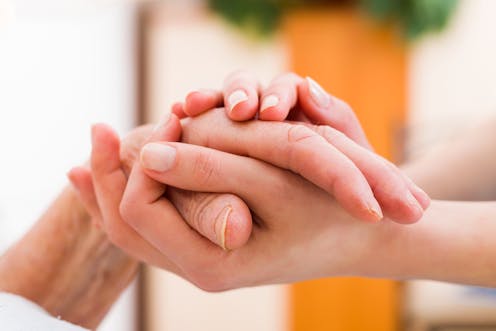We need to address questions of gender in assisted dying
- Written by Rachael Wong, Adjunct Lecturer, School of Law, University of Notre Dame Australia

One of the principal motivations behind current efforts to legalise assisted suicide in Victoria and New South Wales (and most jurisdictions) is patient autonomy. However, research suggests “gendered risks” may thwart women’s autonomy in end-of-life decisions, making them uniquely vulnerable to assisted suicide laws.
While eligibility under the Victorian and NSW bills requires that a patient must be suffering from a terminal illness from which they will likely die in 12 months, the concern for women is that the final decision to end their lives may nevertheless be influenced by risk factors that challenge the rhetoric of “choice”. Here are some of those “gendered risks”.
Longer life span
Women tend to live longer than men. This means they are more likely to develop diseases and disabling conditions, or experience elder abuse and discrimination, both of which could motivate the desire for assisted suicide.
The Australian Law Reform Commission’s report on elder abuse recognised that women are significantly more likely to be victims than men, and that the rate of neglect of older women could be as high as 20%.
More likely to experience their partner’s death
Women are also more likely to experience the death of a partner or spouse due to their relative longevity, and to be deprived of this support and companionship in older age. A 2013 Australian study found that living alone is an important predictor of suicide in older adults.
A 2016 US study found that loneliness was a key motivation for assisted suicide requests of patients with “psychiatric” disorders in the Netherlands. Of the cases reviewed, 70% were women and 76% were 50 years or older. One women in her 70s “without health problems” said she experienced life without her husband as a “living hell” and “meaningless”.
Fewer economic resources in old age
Women have fewer economic resources when they are older, the time when decisions about assisted suicide are most likely to occur.
This entrenched economic disadvantage limits their options for care and means they are more likely to face other financially related adversities.
Women are also more likely to have to pay for care than men due to their male partners and families being less likely to care for them.
All these factors could influence a decision on assisted suicide.
More self-sacrificial and less assertive
Women are arguably more self-sacrificial and less assertive than men, whether by nature, socialisation or simply in terms of society’s ideals about femaleness.
So, they may be more likely to request assisted suicide to spare their loved ones the burden of caring for them, or be persuaded that their life is unworthy of others’ care and their family’s resources.
In a study of assisted suicides where the majority of cases were women, the fear of being a burden was a prominent reason for deciding for death. The ethic of self-sacrifice was summed up by a friend of one of the suicides, who said:
She felt it was a gift to her family, sparing them the burden of taking care of her.
Preference for passive suicide methods
Women demonstrate a stronger preference for more structured, passive methods of suicide, with significant physician participation.
It is clear that increasing numbers of women decide to die when offered the more passive options of assisted suicide. The rate of assisted death of women in the Netherlands, Oregon and elsewhere is nearly four times that of the usual female suicide rate.
One explanation might be that decisions for assisted suicide fit in with cultural expectations of women as passive and compliant, and play out gender expectations of subordination and dominance in a profession where physicians are still predominantly male.
More likely to attempt suicide
Women are more likely to attempt suicide than men, as they are more prone to psychological problems such as depression.
While mental illness does not qualify a person for assisted suicide under the Victorian and NSW bills, neither does it disqualify them.
If assisted suicide is legalised, women’s greater propensity to attempt to take their lives as a result of psychological problems, coupled with their preference for more passive methods of suicide, could have a harmful compounding effect on women’s decisions to die. This may already be evident in the 2016 American study.
Entrenched patterns of violence against women
Female assisted suicide needs to be considered in light of pervasive male violence against women, particularly against intimates. Research indicates striking similarities between the broader patterns of male violence against women and at least one kind of assisted death: “mercy killing”.
American and Australian studies indicate that there are more female mercy killings in those countries, mostly by men, who are most often the woman’s partner, and these are characterised by the same themes of domination, possessiveness and control as other gender-based violence.
The prevalence of violence against women in Australia (particularly intimate partner violence) is a serious problem, and so it is vital that we understand whether the dynamics underlying other forms of gendered violence that result in the deaths of women may sometimes also underlie female assisted suicide.
Taking into account gender differences in health care is important. And if there is potential for gendered risks in legalising assisted suicide, this requires further consideration and research in advance of any legislative change.
These insights challenge the presumption that women who decide for assisted suicide are always exercising autonomy. Legalisation could in fact compound oppressive sociocultural influences and facilitate the last of many non-choices for some women.
Authors: Rachael Wong, Adjunct Lecturer, School of Law, University of Notre Dame Australia
Read more http://theconversation.com/we-need-to-address-questions-of-gender-in-assisted-dying-85892




